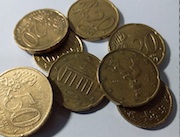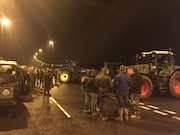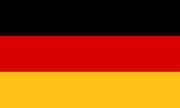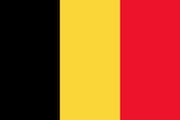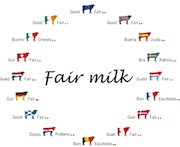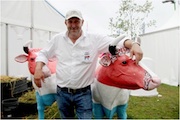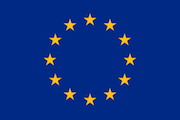EMB Newsletter November 2014
Newsletter as PDF
Contact
EMB - European Milk Board asbl
Rue de la Loi 155
B-1040 Bruxelles
Phone: +32 - 2808 - 1935
Fax: +32 - 2808 - 8265
Dear Dairy Farmers and Interested Parties,
Milk prices are in freefall – all across Europe farm-gate prices are plummeting. The hardest hit are the Baltic states directly affected by the impact of the Russian ban on imports. The current milk prices there are 16-18 cents a litre.
In England milk producers have been protesting for several weeks against the dairies’ continuing slashing of milk prices. The English dairy farmers have drawn attention to the threat to their livelihood with protest campaigns and tractor blockades of distribution centres. On the other side of the Channel, reports from French farmers of falling prices are becoming louder and louder. The situation in Belgium is similar: one Belgian co-operative dairy announced to its members it was cutting the price to about 25 cents from January – “unless a miracle happens... or the EU takes effective measures.”
So far the European Commission has had no adequate measures at its disposal, though. On top of that the milk quota ends in a few months, and the signs throughout Europe are of restocking and increasing production. We in the EMB are already considering how we can react jointly to the worrying situation and what campaigns of action will force the decision-makers to act. One thing is certain – the EMB will make itself seen and heard!
Apart from these negative headlines we also have positive things to report in this Newsletter. The first European Fair Milk Conference is being staged in Ciney, Belgium on 6 November. For several years now the European Milk Board has been using its "Fair Milk" slogan to draw attention to the necessity for cost-covering milk prices. Fair Milk products are currently on sale in six countries – Austria, Belgium, France, Germany, Italy and Luxembourg. Projects like these will help us to keep our family-run farms in the future and guarantee the consumer high-quality food at fair prices.
Erwin Schöpges, EMB
Milk prices and an assessment of the market situation in the individual countries
Milk protests in the United Kingdom
The situation in Germany
Belgian dairy announces 25 cents/litre
First European Fair Milk Conference
Fair Milk in Luxembourg – a success story
Brief news from Brussels
EMB Agenda
The EMB Board’s most important dates in November 2014:
- 4.11.: Meeting: Dialogue with civil society on the TTIP negotiations
- 4.11.: Meeting of the “Beef” Dialogue Group
- 4.11.: Talks with Members of the European Parliament
- 5.11.: Board meeting in Brussels
- 5.11.: Internal meeting of the Fair Milk countries (Brussels)
- 6.11.: First European Fair Milk Conference (Ciney)
- 12.11.: “End of the Milk Quota“ event, Lithuanian Ministry of Agriculture
- 12.11.: Meeting with the German Farmers’ Union, Brussels
- 19.11.: Meeting of the “Milk” Dialogue Group
- 20.-21.11.: Members' Meeting, France
- 27.11.: Meeting of the “International Aspects of Agriculture” Dialogue Group
- 27.11.: “End of the Milk Quota” workshop
Impressum
European Milk Board asbl
Rue de la Loi 155
B-1040 Bruxelles
Phone: +32 2808 1935
Fax: +32 2808 8265
E-Mail: office@europeanmilkboard.org
Website: http://www.europeanmilkboard.org

